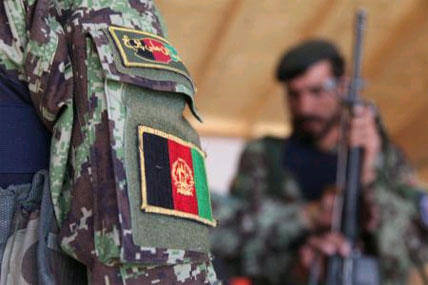Taliban infiltration of the Afghan army and police is much worse than the U.S. military and NATO have admitted and was the main factor in the surprise move to limit contacts with Afghan security forces to curb insider attacks, former ranking U.S. officials in Afghanistan said.
"I would put the percentage rather higher" than the 25% figure for enemy infiltrators and sympathizers that U.S. commanders have estimated, said Ryan Crocker, who stepped down as U.S. Ambassador to Afghanistan in July.
Crocker, who said he held secret meetings with the Taliban in fruitless efforts at a peace settlement, described Taliban leaders as "tough, smart and resilient," and noted that they have embraced infiltration as a main tactic.
"I think we underestimate at our peril" the number of Taliban "sleepers" in the ranks of the Afghan National Security Forces that the allies have been pressing to take the lead security role, Crocker said in remarks Monday to the Carnegie Endowment for International Peace.
A former senior advisor to the U.S. military in Afghanistan lined up with Crocker's assessment that Taliban insurgents were more widespread in the Afghan military and police than NATO would have it.
"So do I. There was an explicit announcement by the Taliban that they were planning to infiltrate," said Sarah Chayes, a senior associate at the Carnegie Endowment and a former advisor to the chairman of the Joint Chiefs of Staff.
"When insider attacks increased sharply some months after that announcement (by the Taliban earlier this year), there is no reason to dismiss the idea that they executed their strategy," Chayes said.
The International Security Assistance Force in Kabul announced Monday that the routine partnering with ANSF by U.S. and allied troops on combat operations and in training was being limited due to the spike in "green on blue," or insider attacks, and the anti-U.S. violence sparked by YouTube video mocking Islam and the Prophet Mohammed.
Partnering would now require the approval of regional allied commanders of two-star rank, according to the directive issued by Army Lt. Gen. James Terry, deputy commander of U.S. Forces in Afghanistan.
ISAF amended the order Tuesday in a statement saying that the limits on contacts with Afghan army and police units would be "temporary."
"ISAF remains absolutely committed to partnering with, training, advising and assisting our ANSF counterparts," the statement said.
"In response to elevated threat levels resulting from the "Innocence of Muslims" video, ISAF has taken some prudent, but temporary, measures to reduce our profile and vulnerability to civil disturbances or insider attacks," the statement said.
In Beijing, on his Asia trip to Japan, China and New Zealand, Defense Secretary Leon Panetta told reporters traveling with him that the 36 insider attacks this year that have killed 51 U.S. and allied troops were signs of a "last gasp" by the Taliban to thwart the U.S. plan to withdraw combat forces in 2014 and turn over control to ANSF.
Former Ambassador Crocker strongly disputed Panetta's take on the resilience of the Taliban.
"I will believe it's their last gasp when I've got my boot on the throat of the last one of them," Crocker told Bloomberg News after his remarks at the Carnegie Endowment.
Panetta also said that the Taliban had failed to hold territory after a recent spate of high-profile attacks, including the raid on Camp Bastion in southwest Helmand province last weekend that killed two Marines and damaged or destroyed eight Marine AV-8B Harrier jets.
But holding territory has also been a secondary goal for U.S. commanders. U.S. leaders from Gens. Stanley McChrystal and David Petraeus through the current ISAF commander, Marine Gen. John Allen, have all put the emphasis on "human terrain" in the effort to win the allegiance of the Afghan people, and on the "shohna ba shohna (shoulder to shoulder)" partnering with ANSF.
In his remarks at Carnegie, Crocker reflected on his long career as a diplomatic troubleshooter in Afghanistan, Iraq, Syria, Lebanon and Pakistan, and also regretted the missed opportunities for a better outcome in Afghanistan that he said would have reverberated through the region.
The only thing that surprised him about the Taliban insurgency was that "it took longer to develop than I thought it would," Crocker said.
Crocker noted that he was in Kabul in early 2002 and helped raise the U.S. flag again over the long-abandoned U.S. Embassy. The Taliban and al Qaeda had been pushed into Pakistan, but the administration of former President George W. Bush ignored his pleas to pour in troops and aid, and instead turned to planning the invasion of Iraq, Crocker said.
"This was regime change on the cheap," Crocker said. When he objected, he was told by Washington to "go sit under a tree," Crocker said.
Crocker also for the first time detailed his contacts with Iran in late 2001 and early 2002. He said that the Iranians were also eager to see the downfall of the Taliban and were seeking to engage with the U.S. His contact asked him "what do you need to know to knock their blocks off. Ask us, we got the answers," Crocker said.
The Iranians "very much had a common interest and a common cause" with the U.S. on Afghanistan that was rejected by Washington, Crocker said. Once Bush made the "Axis of Evil" speech, naming Iraq, Iran and North Korea as the main sources of world terror, his Iranian contacts dried up, Crocker said.
His next encounter with his Iranian contact "was not a happy encounter," Crocker said.
Crocker said the current Taliban leadership was tough and adaptive. "We've killed all the slow and stupid ones," he said. Despite a long string of U.S. missteps, Crocker also said the U.S. must press ahead to establish a stable Afghanistan to avoid the possibility of another 9/11 attack being hatched in Afghanistan, and to prevent reprisals against Afghans who sided with the U.S.
"If it could happen again," Crocker said of a 9/11 attack, "it could happen from Taliban-controlled Afghanistan."
Crocker also warned of a possible bloodbath if the U.S. pulls out before ANSF is ready to take over. "Who gets it in the neck? It's all those people we made all those promises to, starting with the women" of Afghanistan who have struggled for civil rights and education in the male-dominated society, Crocker said.



























